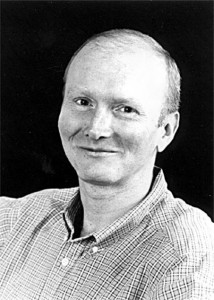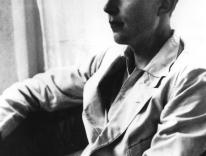 A friend passed away on Monday, and my shock was compounded by the fact that I first heard the news on NPR. Mark O'Donnell was a kind and generous mentor to me and a litter of other younger writers fortunate enough to have made his acquaintance. He was a Tony Award winner, having co-written the book for the Broadway musical hit Hairspray (as well as a follow-up John Waters musical project, the underappreciated Cry-Baby). He was a playwright, novelist and humorist worth knowing about. And he was someone I feel immensely blessed to have known.
A friend passed away on Monday, and my shock was compounded by the fact that I first heard the news on NPR. Mark O'Donnell was a kind and generous mentor to me and a litter of other younger writers fortunate enough to have made his acquaintance. He was a Tony Award winner, having co-written the book for the Broadway musical hit Hairspray (as well as a follow-up John Waters musical project, the underappreciated Cry-Baby). He was a playwright, novelist and humorist worth knowing about. And he was someone I feel immensely blessed to have known.
My good fortune started when I gained admittance to the very popular humor-writing seminar Mark taught at Yale. Mark was formidably brilliant, but also kind and encouraging, which came as a surprise -- the atmosphere in a room of comedy writers is frequently competitive and curdled. Mark genuinely wanted everyone in that room to find their potential, and he shared his ideas, his punchlines, and his time to help us get there. In my case that generosity continued long after the class was over.
When I started looking for work in New York, Mark wrote an effusive reference letter, and he also helped me get a babysitting gig. He introduced me to old friends of his who happened to be minor heroes of mine. When he wanted to downsize his book collection, he set aside a volume of essays by Mary McCarthy with me in mind. He cheered me on when I reported small writing victories (I'd been published! I'd been paid!). And when I encountered a setback, he encouraged me to use it for creative fuel. "Out of the frying pan and into the file. I quote myself. Love, Mark."
I can see now that I was one of a crowd of writers who looked to Mark for approval, guidance, and encouragement as we made our various ways in the world. We acolytes and friends have been trading remembrances online over the past few days, and it seems Mark's unique combination of wit and kindness was something no one could ever quite get over. "He was really, really brilliant," a friend of a friend recalled on Facebook. Like, 'Why is this brilliant person being so nice to me?' brilliant." And Mark's twin brother, Steve (also a comedy writer), told the New York Times that Mark was "almost unearthly in his sweetness."
It's the Hairspray gig, and the Tony Award it brought, that has gotten the most attention in notices about Mark's death. (It so happened that Marvin Hamlisch, who wrote the score for A Chorus Line, died the same day, and so the two names were yoked in Twitter tributes lamenting the blow to the theatre community. One young musical-theatre fan tweeted something like, "It's so hard to believe, two Broadway composers in one day!" which struck me as the sort of thing Mark would have found funny.) But there's much more he should be remembered for.
A few years ago I recommended one of his novels in a Christmas Critics writeup for Commonweal:
Mark O'Donnells writing is eager and energetic, full of giddy wordplay. His novel Let Nothing You Dismay (Vintage, $12, 193 pp.) follows Tad Leary, a young, gay New York grad student, on a one-day whirlwind tour of seven holiday parties. Along the way, O'Donnell teases bittersweet wisdom and poignant punch lines out of mundane details, like song lyrics, advertising slogans, and a chalkboard in an empty classroom that says, "Please save!"
Tad is working -- or rather, not working -- on a study of social hierarchies in folklore (for example: angels, archangels, principalities, powers...). But he is less comfortable in the real-life social networks of academia, urban life, and family. For him, the holiday season is one of joyous strain, in another phrase borrowed from a Christmas carol. He is haunted by his personal and romantic failures, but cowed by the challenges of intimacy. "He pined for his family," O'Donnell writes, "But then had the urge to flee in their midst." The time Tad spends in the midst of his Irish-Catholic family is the novels most memorable chapter. Every detail rings true, especially the melancholy brooding of Mrs. Leary, who "always sighed after she laughed, as if to remind everyone she would be resuming her customary burden now." Tad survives the holiday-party gauntlet, and the novel ends on a hopeful note: Christmas hasn't arrived yet, but it's getting closer.
The sad news of Mark's passing led me to pick up and reread his other melancholy-hopeful novel, Getting Over Homer (1996), which is also about a young gay man looking for companionship and (as he puts it) Communion in New York City. Here is the narrator, Blue, recalling his childhood in working-class Cleveland:
You tell me if a big family makes me more isolated or less than, say, an only child, like my college roommate Dana, whose parents knew what he was majoring in, but criticized it.
We were perfunctorily Catholic at best, or worst, and I don't think I can blame my emotional problems on nuns the way everyone else on Earth has, Catholic or not. We went to public school, and Jesus and Mary were never mentioned at our house, though every bedroom did have a crucifix. I think Mom was just observing the technical requirements there, like with fire extinguishers.
Though these books, and all of Mark's writing, are stuffed with clever quips and turns of phrase, I find it's the insights I remember best. Mark's humor was compassionate rather than cruel. He could make a joke out of anything, not through mockery, but by introducing a new perspective, unexpected but deeply humane. (I suppose compassion itself requires a willingness to see things from a different perspective.) What I love most about his books are his precise depictions of life's ordinary absurdities: growing up in a big Irish Catholic family, or enduring the bittersweet fallout of a romance that turns out to be more mirage than marriage. His short humor pieces are dazzling, but his novels have made me laugh through tears.
Steve O'Donnell wrote a tribute to his brother for the New Yorker's website, with links to some of his wonderful pieces for the magazine. More Googling led me to this interview from last summer in the Cleveland Plain Dealer, which conveys some of his sense of humor and general pleasantness. And my friend Mike (another preternaturally kind and generous comic writer and mentor-type -- really, its a wonder I didn't turn out funnier) wrote this personal reflection, which captures so much of what made Mark special:
Mark conjured mirth out of nothing. You'd simply be chatting, unaware that this, too was a time for comedy, and a phrase you'd just used would be shot back, slightly refolded, much more amusing, and perceptive, too. Mark's observations, while hilarious, never felt prepared. Because, see, this is the dirty little secret about comedy writers: all we do is hoard the amusing thoughts that come in the course of a day, then lay them out, one after the other. If you're the deliverer, you feel smart, but the target walks away feeling slightly manipulated, an amused but unwilling audience, knowing that whatever just took place, it wasn't actual friendship. Mark wasn't like that; his material came of its own accord, too tailored to the moment to be canned. He was totally present, just super-observant, processing four possibilities to your one.
A few years back, when I wrote a piece that attracted some fleeting attention online, I sent Mark the link. "Congratulations!" he wrote back cheerfully. "I hope this catapults you to obscurity, alongside me!"
I should be so lucky.


